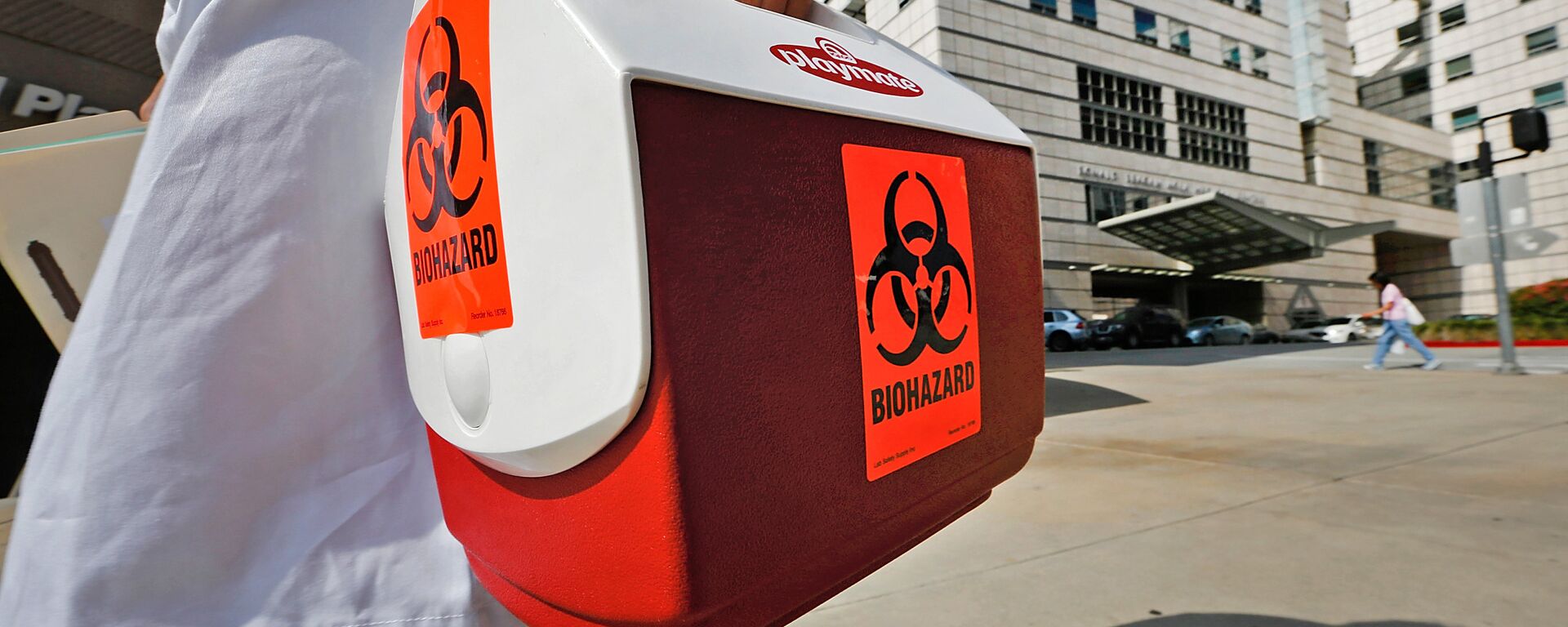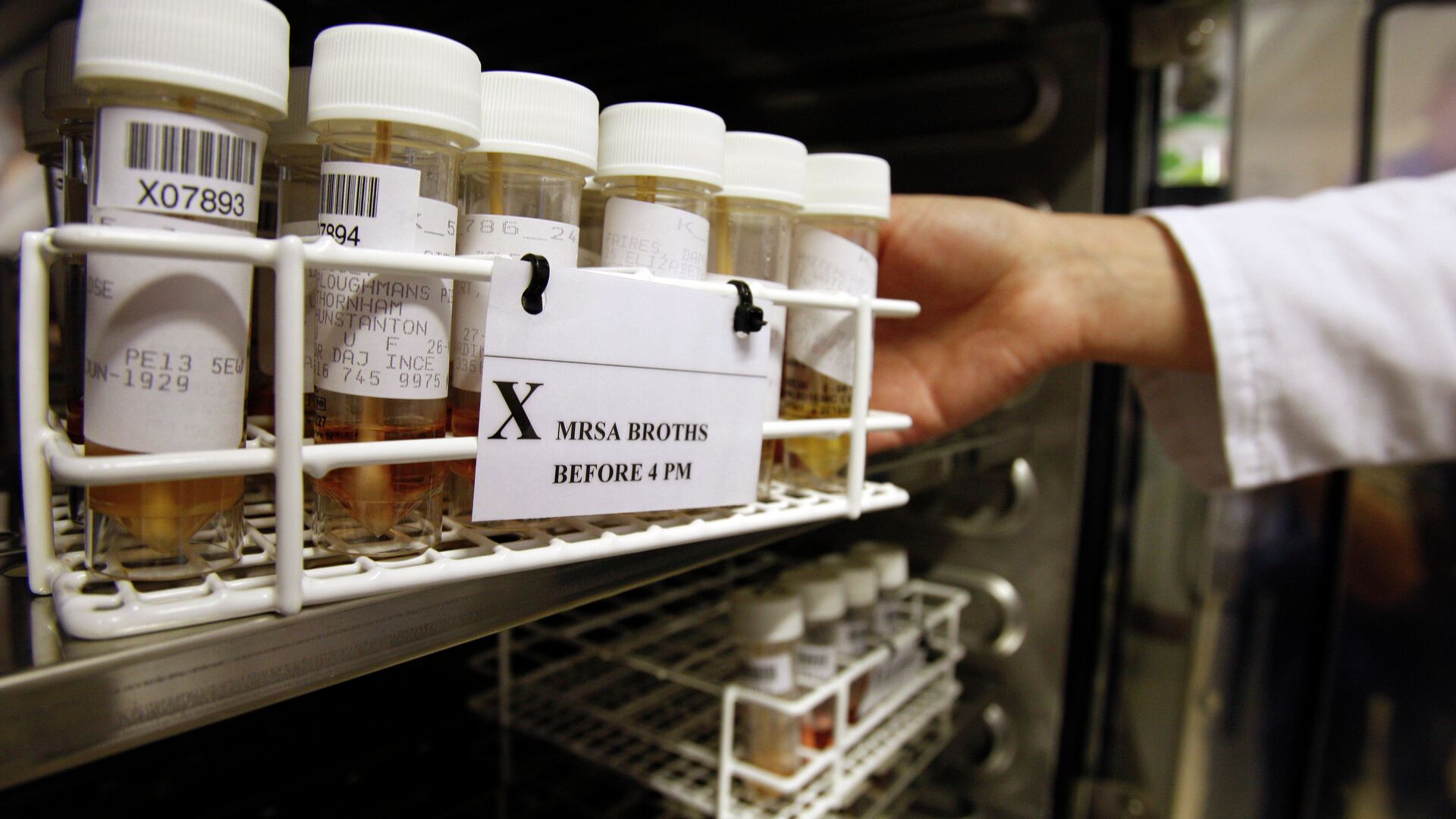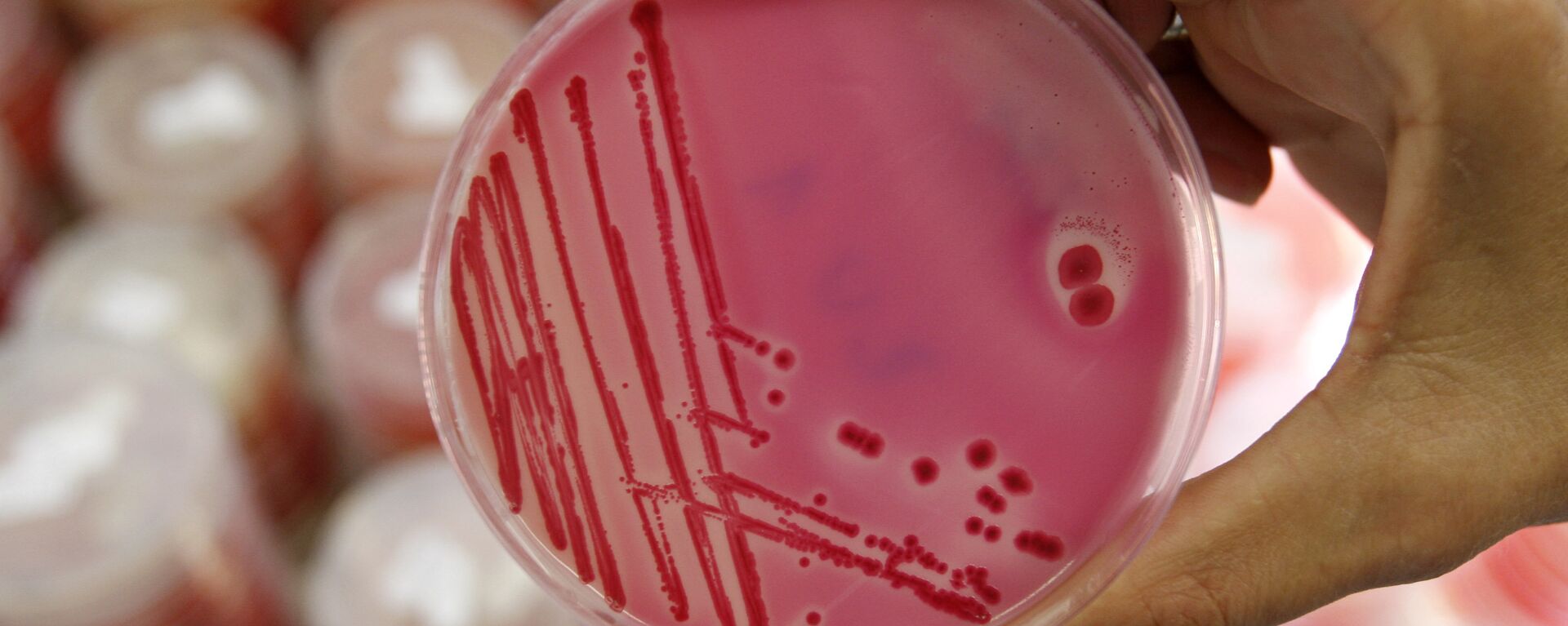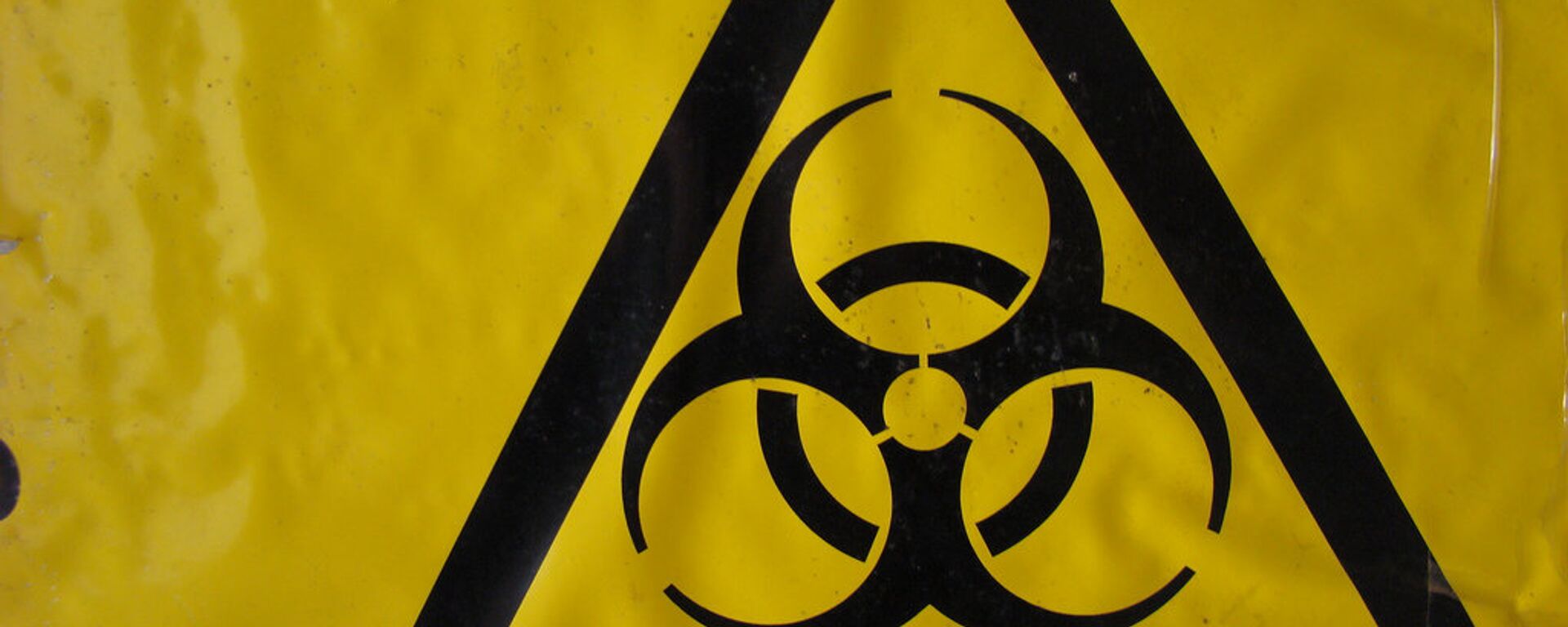https://sputnikglobe.com/20231003/experiments-were-carried-out-why-ukrainian-soldiers-becoming-antibiotic-resistant-1113885591.html
'Experiments Were Carried Out': Why Ukrainian Soldiers Becoming Antibiotic-Resistant
'Experiments Were Carried Out': Why Ukrainian Soldiers Becoming Antibiotic-Resistant
Sputnik International
A European healthcare system found that Ukrainian citizens who have arrived for treatment often have dangerous bacteria and antibiotic resistance. Western media raised the alarm about this phenomenon that might threaten the entire continent.
2023-10-03T15:24+0000
2023-10-03T15:24+0000
2023-10-03T15:24+0000
europe
world
biolab
ukraine
us centers for disease control (cdc)
bioweapon
biological weapon
biological warfare
biological experiments
antibiotic resistance
https://cdn1.img.sputnikglobe.com/img/101343/74/1013437434_0:218:3834:2375_1920x0_80_0_0_420c4dbe1fdbf284dabef47774434343.jpg
Hospitals in several European countries have recorded significant growth of antibiotic resistance among Ukrainians arriving for treatment. So far, the exact cause of this remains unclear. The first case was announced in a research letter for the Centers for Disease Control (CDC) in Germany in August, when a Ukrainian soldier was diagnosed with a number of dangerous infections that were not treatable with antibiotics.Western media recently highlighted that similar incidents were registered in several unnamed European countries, where wounded soldiers and refugees from Ukraine had gone. They cited “hospital and hygiene infrastructure” problems in Ukraine as one of the reasons the diseases spread, making “it harder to take the usual precautions against antibiotic resistance.” Media also pointed out the absence of tests to determine the correct antibiotic use in Ukrainian hospitals. Therefore, infections and antibiotic-resistance are often found only in Europe.However, experts told Sputnik that antibiotic resistance could be a sign that these people had undergone biological experiments.Dangerous BacteriaThe German CDC report claims the first case was officially registered in Germany. The wounded Ukrainian soldier was taken from Dnepropetrovsk to Kiev first, and then to an American military hospital in Germany. It was only when he was there that he was tested for infections and the unexpected discovery was made.According to the CDC, Acinetobacter baumannii, Pseudomonas aeruginosa, and Klebsiella pneumoniae can cause pneumonia, meningitis, as well as infections in wounds and in the urinary tract.Ukrainians, both military personnel and refugees, can be carriers of dangerous infections across both Ukraine and Europe. Thus, US researchers warned European countries of an “increased risk” of the spread of multidrug-resistant organisms (MDR):Nevertheless, immunologist Vladislav Zhemchugov, an expert in especially dangerous infections, believes that there is no epidemic risk in Europe because of the hospital-acquired nature of infection transmission. But antibiotic resistance is a serious problem.Biological Weapon AgentsLow standards of healthcare and uncontrolled use of antibiotics may not be the only causes of resistance. Igor Nikulin, former UN Commission on Chemical, Bacteriological, and Biological Weapons inspector, suggests there is another reason for such a dangerous trend. He explained that biological weapons agents - people who underwent biological experiments - were also resistant to antibiotics. There has been a clear example of such a phenomenon in the US.Russian MoD Warned About This Last YearIn July 2022, a report from Russia's Ministry of Defense claimed that Ukrainian military personnel were involved in experiments to assess the tolerance of dangerous infectious diseases.He also noted that Russian healthcare experts found antibodies against pathogens of a number of infectious diseases in Ukrainian prisoners of war: 33% of them were sick with hepatitis A, more than 4% had a fever with renal syndrome, while 20% had West Nile fever. According to the Russian military chief, these figures significantly exceeded the statistical average.Apparently, Ukrainian military personnel have already been treated for the listed infectious diseases, Igor Nikulin explained:
https://sputnikglobe.com/20230815/robert-kennedy-jr-admits-existence-of-us-bio-labs-in-ukraine-1112605514.html
https://sputnikglobe.com/20230412/us-working-on-universal-genetically-engineered-bioweapon-russian-parliamentary-investigation-1109381193.html
https://sputnikglobe.com/20230310/us-failed-to-deactivate-biolabs-in-ukraine-before-military-operation-as-washington-claimed-moscow-1108257926.html
https://sputnikglobe.com/20230201/truth-too-big-to-hide-how-washington-fails-to-sweep-ukraines-biolab-revelation-under-rug-1106893548.html
https://sputnikglobe.com/20230623/us-uk-seeking-to-destabilize-central-asia---russian-security-council-1111418617.html
ukraine
Sputnik International
feedback@sputniknews.com
+74956456601
MIA „Rossiya Segodnya“
2023
Christina Malyk
https://cdn1.img.sputnikglobe.com/img/07e7/09/08/1113208579_137:0:1097:960_100x100_80_0_0_39342d3133a15b1549ec31c158221a34.jpg
Christina Malyk
https://cdn1.img.sputnikglobe.com/img/07e7/09/08/1113208579_137:0:1097:960_100x100_80_0_0_39342d3133a15b1549ec31c158221a34.jpg
News
en_EN
Sputnik International
feedback@sputniknews.com
+74956456601
MIA „Rossiya Segodnya“
Sputnik International
feedback@sputniknews.com
+74956456601
MIA „Rossiya Segodnya“
Christina Malyk
https://cdn1.img.sputnikglobe.com/img/07e7/09/08/1113208579_137:0:1097:960_100x100_80_0_0_39342d3133a15b1549ec31c158221a34.jpg
antibiotic resistance, us biolabs, american biolabs, american bioweapon, us defense department, ukrainian biolab, us biolabs in ukraine, us biological weapons program, us biological weapons program, u.s. biological weapons program, ukrainian labs, artificial diseases, us bio-research, american bioweapon, american biolabs, biowarfare, bioterrorism, biological threat, artificial infection, bioprogram, bioresearch, contagious diseases, drug-resistant bacteria, drug-resistant diseases, drug-resistant germs
antibiotic resistance, us biolabs, american biolabs, american bioweapon, us defense department, ukrainian biolab, us biolabs in ukraine, us biological weapons program, us biological weapons program, u.s. biological weapons program, ukrainian labs, artificial diseases, us bio-research, american bioweapon, american biolabs, biowarfare, bioterrorism, biological threat, artificial infection, bioprogram, bioresearch, contagious diseases, drug-resistant bacteria, drug-resistant diseases, drug-resistant germs
'Experiments Were Carried Out': Why Ukrainian Soldiers Becoming Antibiotic-Resistant
One European healthcare system found that Ukrainian citizens arriving for treatment often have dangerous bacteria and antibiotic resistance. Western media raised the alarm about this phenomenon, which might threaten the entire continent.
Hospitals in several European countries have recorded significant growth of antibiotic resistance among Ukrainians arriving for treatment. So far, the exact cause of this remains unclear. The first case was announced
in a research letter for the Centers for Disease Control (CDC) in Germany in August, when a Ukrainian soldier was diagnosed with a number of dangerous infections that were not treatable with antibiotics.
Western media recently highlighted that similar incidents were registered in several unnamed European countries, where wounded soldiers and refugees from Ukraine had gone. They cited “hospital and hygiene infrastructure” problems in Ukraine as one of the reasons the
diseases spread, making “it harder to take the usual precautions against antibiotic resistance.” Media also pointed out the absence of tests to determine the correct antibiotic use in Ukrainian hospitals. Therefore, infections and antibiotic-resistance are often found only in Europe.
However, experts told Sputnik that antibiotic resistance could be a sign that these people had undergone biological experiments.

15 August 2023, 11:51 GMT
The German
CDC report claims the first case was officially registered in Germany. The wounded Ukrainian soldier was taken from Dnepropetrovsk to Kiev first, and then to an American military hospital in Germany. It was only when he was there that he was tested for infections and the unexpected discovery was made.
“Doctors obtained blood, urine, respiratory, and peri-rectal surveillance cultures. Surveillance cultures grew A. baumannii, Enterococcus faecium, Klebsiella pneumoniae, and two distinct morphologies of P. aeruginosa. Blood cultures grew a third P. aeruginosa. By using the Vitek 2 automated system, the gram-negative organisms were found to be non-susceptible to almost every antibiotic tested,” the paper explained.
According to the CDC,
Acinetobacter baumannii,
Pseudomonas aeruginosa, and
Klebsiella pneumoniae can cause pneumonia, meningitis, as well as infections in wounds and in the urinary tract.
Ukrainians, both military personnel and refugees, can be carriers of dangerous infections across both Ukraine and Europe. Thus, US researchers warned European countries of an “increased risk” of the spread of multidrug-resistant organisms (MDR):
“As a result, healthcare networks in Europe now consider prior hospitalization in Ukraine to be a critical risk factor for colonization of MDR organisms (7,10). Healthcare practitioners treating citizens of Ukraine need to be aware of the increased risk for MDR organism transmission and infection imposed by the conflict in Ukraine and implement appropriate infection control measures to mitigate their spread.”
Nevertheless, immunologist Vladislav Zhemchugov, an expert in especially dangerous infections, believes that there is no epidemic risk in Europe because of the hospital-acquired nature of infection transmission. But antibiotic resistance is a serious problem.
“A huge range of microbes enters wounds along with the soil, which require both certain treatment skills and modern drugs. Low effectiveness in treating the wounded and a large number of purulent complications indicate resistance to antibiotics. Moreover, the use of antibacterial agents requires a special system. Because if you uncontrollably start with the strongest antibiotics, there will be nothing to treat with at all. With serious injuries, this problem gets worse: it turns out that not all bacteria can be removed from the body with one antibiotic, and medical staff have to spend several days searching for the way treat them,” he said.
Low standards of healthcare and uncontrolled use of antibiotics may not be the only causes of resistance.
Igor Nikulin, former UN Commission on Chemical, Bacteriological, and Biological Weapons inspector, suggests there is another reason for such a dangerous trend. He explained that biological weapons agents - people who
underwent biological experiments - were also resistant to antibiotics. There has been a clear example of such a phenomenon in the US.
“Specifically, in 2001, Americans received envelopes containing anthrax spores. That strain was precisely resistant to antibiotics and commercial vaccines that are used to treat the disease. The strain was well-known as American. And in general, it should not have been in the US in accordance with the Biological Toxin Weapons Convention of 1972. So I think something similar was going on here. We have noticed more than once that as soon as hostilities began in the Donbass, various atypical diseases for this region immediately appeared. Here I mean SARS, bird flu and the like. All this is connected with the activities of US military biological laboratories,” the expert added.

1 February 2023, 16:46 GMT
Russian MoD Warned About This Last Year
In July 2022, a
report from Russia's Ministry of Defense claimed that Ukrainian military personnel were involved in experiments to assess the tolerance of dangerous infectious diseases.
“A lack of therapeutic effect was revealed while administrating of antibacterial drugs. High concentrations of antibiotics, including sulfonamides and fluoroquinolones, were detected in Ukrainian military personnel blood. This fact may indicate the prophylactic use of antibiotics and the personnel’s preparation to perform tasks in conditions of biological infection. For example, preparation for the causative agent of cholera, which indirectly confirms the information of the Russian Ministry of Defense about the planning of the biological agents use by Ukrainian special forces,” chief of the Radiation, Chemical, and Biological Protection Troops of the Russian Armed Forces Igor Kirillov pointed out.
He also noted that Russian healthcare experts found antibodies against pathogens of a number of infectious diseases in Ukrainian prisoners of war: 33% of them were sick with hepatitis A, more than 4% had a fever with renal syndrome, while 20% had West Nile fever. According to the Russian military chief, these figures significantly exceeded the statistical average.
“Taking into account the fact that these diseases were actively studied by the Pentagon as part of Ukrainian projects, there is a reason to suggest that Ukrainian military personnel were involved as volunteers in experiments to assess the tolerance of dangerous infectious diseases,” Kirillov summed up.
Apparently, Ukrainian military personnel have already been treated for the listed infectious diseases, Igor Nikulin explained:
“A large number of antibodies were detected in the soldiers’ blood: plague, polarimia, anthrax, Congo-Crimean hemorrhagic fever in almost all of them. So they probably were treated for these diseases. Therefore, there is a high level of antibiotics in the blood, and the strain, from which they got sick. So it got resistant to all antibiotics. Some experiments were carried out on them.”








